The House and Senate both passed FAA reauthorization bills. That left a committee from both chambers to decide what actually went into the bill that heads back for a vote. What’s in the final bill coming out of conference is probably what gets passed and signed by the President. This is what’s really inside.
Here’s the final text. The .pdf file is 1,069 pages. It spends $105 billion. No one will actually read the whole document before voting on it. Some might read the 79 page summary.
The breadth of this bill is incredible, from large spending initiatives and a focus on air traffic control and safety, to pet issues like banning Covid vaccine requirements. Here’s a summary of some of the major items that did – and did not – make the bill, with a focus on some of the most controversial. I’ve also included a larger list of some smaller items I noticed, not all of which were included in bill summaries provided by the committees in Congress.
Ted Cruz Doesn’t Get Private Screening And Airport Escorts
Senator Ted Cruz (R-TX) managed to get an amendment to exempt top politicians from standard airport security it into the Senate’s final FAA reauthorization bill.
Members of Congress, Cabinet Secretaries, and federal judges who have received any threats (and they almost all receive threats at some point) would have received an escort for their entire journey through commercial airports and won’t be required to go through normal screening – instead receiving private screening.
TSA has estimated the cost of letting politicians, their families, and two accompanying staff members opt out is public security and providing them VIP secure escort throughout their airport experience at $11 – $55 million per year if undertaken by TSA and $112 – $527 million per year if undertaken by federal air marshals.
In the past, Senator Cruz has shown up late for the airport and missed his flight, without special services, declaring “don’t you know who I am?”
Famously, Senate Cruz flew to Cancun when his home state’s power grid failed and residents experienced widespread outages for days (people died). The photographs of him were a huge political blunder. Avoiding public areas of airports would keep him out of the spotlight when he flies.

Ted Cruz at Mexican immigration
Cruz says that politicians (and other high ranking officials) need this for security, but:
- airports are generally more secure than other public spaces where our betters spend time
- there’s no meaningful history of attacks taking place in airports, where myriad law enforcement agencies already have a strong presence and where members of the public go through security searches themselves
Commercial airports are among the last places where politicians need greater protection – protection that isn’t provided to ordinary citizens under active threat.
Rep. Bennie Thompson (D-MS), who largely does whatever TSA tells him to do, killed this provision in conference after lobbying by the agency. It’s perhaps the one time that Thompson, and TSA, did the right thing.
Politicians need to eat their own dog food. Until they stand in long security lines, go through the shoe carnival, and have their water bottles confiscated they’re not in a position to exercise their oversight obligations of the federal Transportation Security Agency. And since airports in the U.S. are generally owned by governments, and receive federal funding, they should experience those airports the same way their constituents do.
New “Beyond Perimeter” Slots At Washington’s National Airport
Flights from Washington’s National airport are limited to 1,250 miles unless they are one of a handful of exception flights provided for in legislation and handed out by the Department of Transportation. A beyond perimeter flight is valuable. Southwest Airlines, for instance, has the only legally-permitted flight between National airport and Austin. No other airline is allowed to compete on that route. Other options either involve connections or going to Dulles. Here are the current routes:
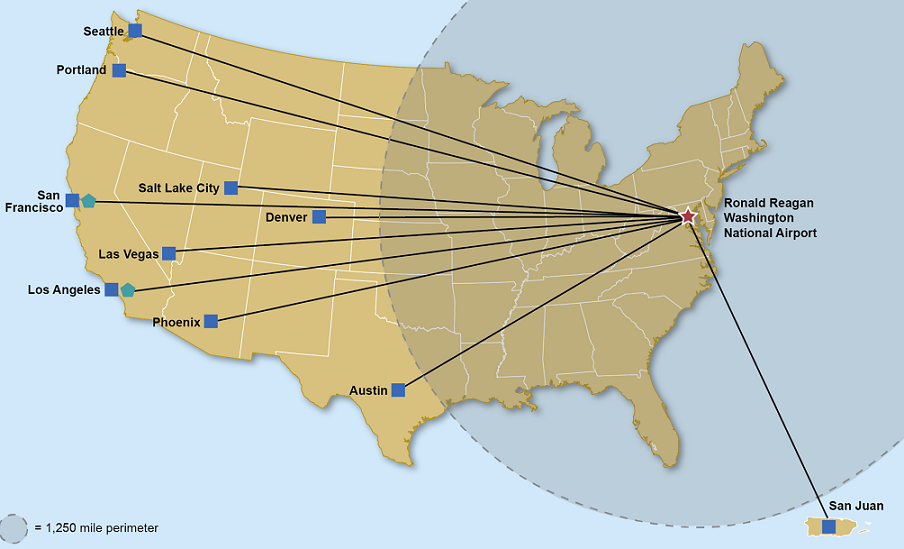
The bill authorizes 10 new slot exemptions at National airport. 8 go to the current big incumbents at the airport. 2 go to limited incumbents. None go to new entrants. Each airline gets 2. DC’s airport authority is forbidden from finding airlines who take advantage of these slots.
This appears to split the new flights equally across four of (American Airlines, Delta, United, Southwest, JetBlue) and one to (Alaska, Frontier or Republic). Under 14 CFR § 93.213 I believe a limited incumbent means fewer than 40 slots, excluding international, overnight and Essential Air Service slots although I am open to correction on this.
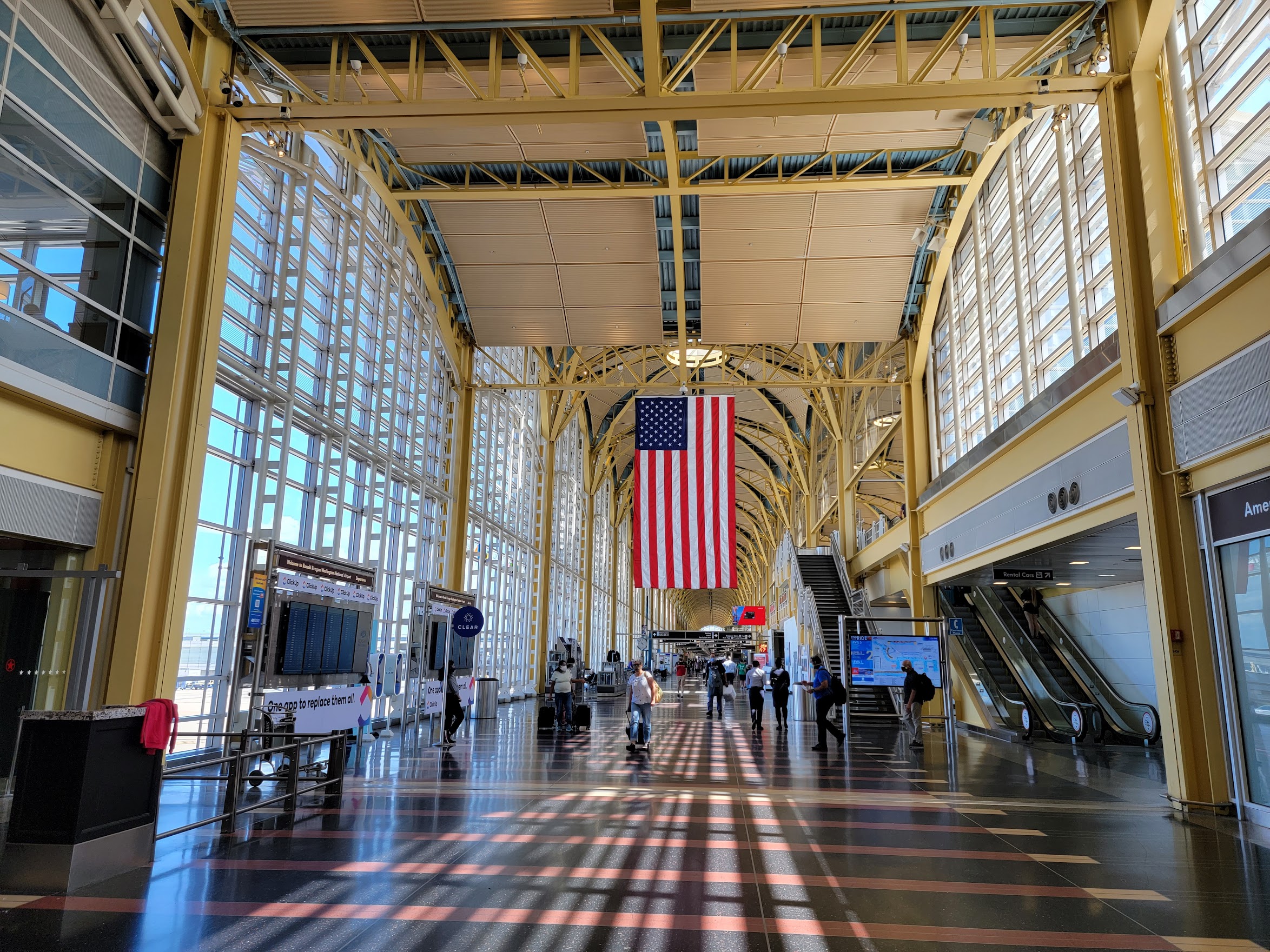
Washington National Airport, National Hall
This is ultimately a lobbying win for Delta, and a loss for United, but not nearly what Delta originally wanted.
They sought 28 new roundtrips a day, with many going to them. United of course loves slot restrictions at National, because it protects longer flights from their hub at Washington Dulles where there’s a virtual monopoly.
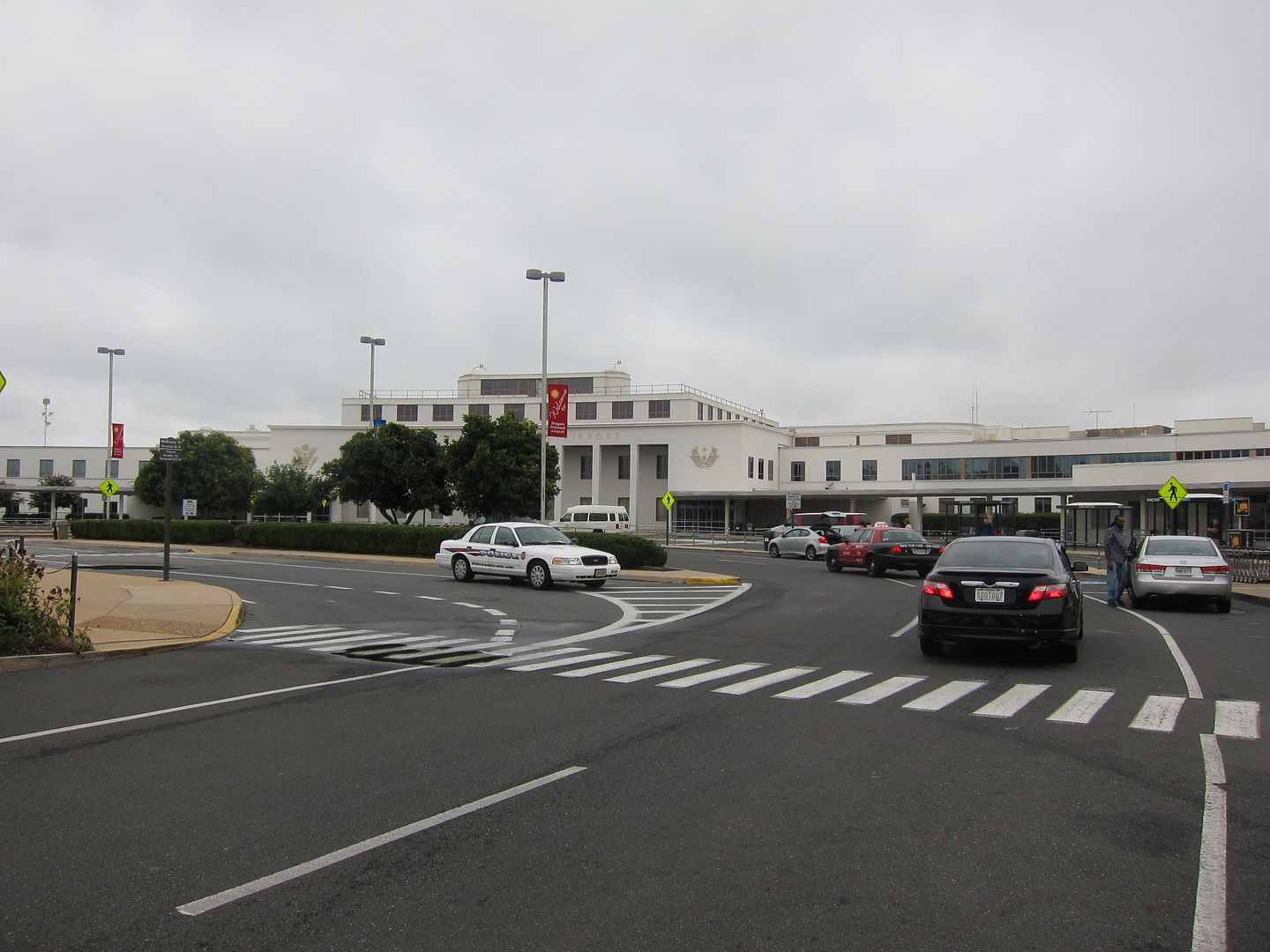
Washington National Airport Historic Terminal
National is one of the most on-time airports in the United States. When the slot system was set up, it was assumed that 10% of the airport’s traffic would be private jets. With post-9/11 security restrictions there are almost no private movements at the airport. It can handle some additional flying and there are times during the day where flying volume falls.
Interestingly – and nothing will change any time soon – but the bill includes a study of the Washington D.C. Special Flight Rules Area and Flight Restricted Zone and whether it’s possible to reduce the impact of restrictions on commercial airlines and make it possible for private planes to use the airport again. Currently planes are kept away from the capital and must follow strict requirements when flying in and out of the airport.
25 Hour Cockpit Voice Recording
Though pilots are opposed to it, the Act requires cockpit voice recorders to hold up to 25 hours of conversation before recording over information. New aircraft will have to have this within a year, and other covered aircraft within 6 years.
Last January an American Airlines crew headed to London taxied on the wrong runway as a Delta 737 began its take off roll. This was nearly a disaster of epic proportions, as the American jet crossed right in front of Delta, and the Delta plane hit the brakes.
The Delta flight stopped less than 1000 feet from where it would have intersected with American’s plane. The transatlantic 777 didn’t follow air traffic control instructions.
The incident wasn’t immediately reported to the airline. The pilots decided to continue flying to London, despite being almost certainly shaken by what had (almost) happened. And we’ll never really know what was going on in the cockpit, because the pilots continued flying and the voice recording was written over. In fact there is speculation that the pilots decided to continue to London so that the recording of what happened would be written over.
Following this January’s Alaska Airlines Boeing 737 MAX 9 incident, the NTSB determined that the cockpit voice recorder, in place to help review aviation incidents and make flying safer, had already been recorded over. Two hours of recording time isn’t enough when it takes awhile to recover a ‘black box’.
More Than Doubling Subsidies For Small Community Air Service
The Essential Air Service program was created in the late 1970s as a temporary measure to soften the blow of deregulation. It provided for a ’10 year transition’ period in which small community service could receive subsidies. And it’s the perfect example of the old axiom that there’s nothing as permanent in life as a temporary government program. The program was supposed to end in 1988.
Now, about 175 communities have been receiving subsidies. A third of those are in Alaska.
- Generally 30-50 seat aircraft, and usually two roundtrips a day
- Or more frequencies with 9-seat aircraft
Subsidized cities are supposed to have at least 10 passengers per day, though this requirement can be waived. Many of the planes fly largely empty.
This bill more than doubles funding for essential air service and allows subsidies of up to $850 per passenger starting in fiscal year 2027. This is down from $1,000.
Airports within 210 miles of a medium hub or larger are currently capped at $200 per passenger. The bill more than triples this, to $650 per passenger and applies this only to airports within 175 miles of the larger facility. That’s the epitome of stupid.
For many of these airports there’s just no justification for subsidies at all.
- When they’re within reasonable driving distance of another airport
- When the average airline passenger has a six figure income, it’s reverse Robin Hood
- And when flying empty planes should raise environmental concerns?
If you’re traveling out of Pueblo, Colorado you could just as easily drive to Colorado Springs to start your journey. Hot Springs, Arkansas is less than an hour from Little Rock. Decatur, Illinois is less than an hour from both Champaign and Springfield. Why subsidize service 110 miles away to St. Louis?
- Lancaster, Pennsylvania is about half an hour from Harrisburg
- Muskegon County Airport is less than an hour from Grand Rapids
- Owensboro-Daviess County, Kentucky is under an hour from Evansville, Indiana
Not only didn’t the program die in 1988, it grew to $22 million in 1998 and to $150 million in 2018. It’s being authorized at:
- $340 million for fiscal year 2025
- $342 million for fiscal year 2026 and 2027
- $350 million for fiscal year 2028
FAA reauthorization also increases Small Community Air Service Development Grant funding.
Making It Harder To Track Elon Musk’s Plane
Whether it’s tracking Elon Musk’s plane or Taylor Swift’s, or hedge funds watching who’s flying where to try to suss out mergers and acquisitions, data on private aircraft is closely followed.
Private aviation aircraft owners and passengers don’t generally like that details on their plane registrations are public, and that their use of air traffic control is public too. They’ve complained loudly, and Congress listened.
The FAA is will have to establish an opt out process to limit the details that are published with aircraft registration, and once this happens (within two years), aircraft owners will be allowed to get new ICAO identification codes.
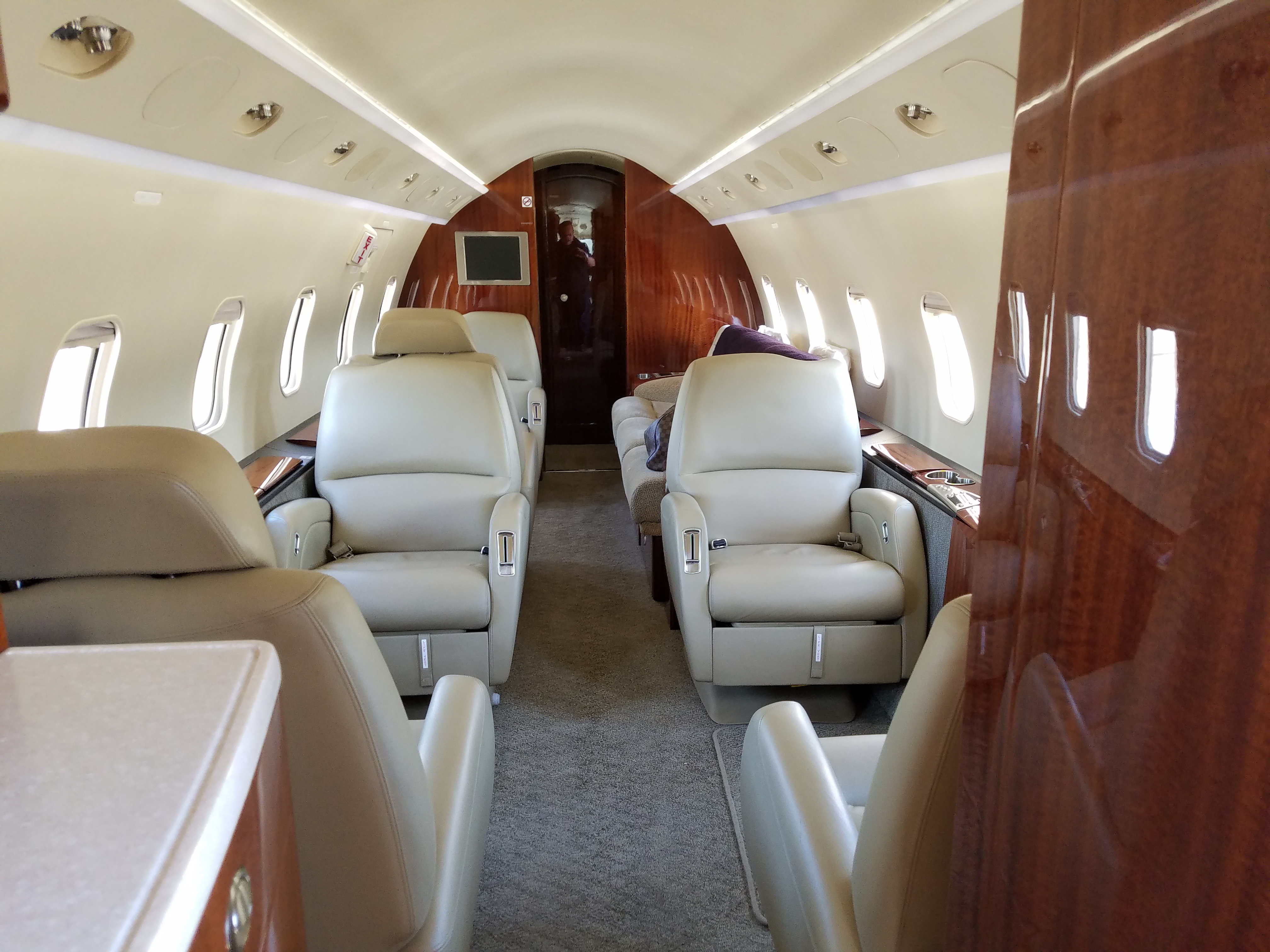
Multiple Broadsides Against DOT’s Regulation Of Charter Carriers
The entire controversy over JSX – where airlines and pilot unions complain that they’re allowed to use retired senior captains from American and Southwest, and co-pilots with experience similar to Europe, and that they can fly from private terminals using planes that have 30 seats – began with SkyWest Charter. The regional airline wanted to create a separate part 135 carrier, using commercial airports but with permission to follow similar pilot rules as JSX.
What SkyWest wanted to do is legal, but the major pilot union complained. To attack the expansion of part 135 flying, they needed to criticize JSX which was already doing this successfully and safely, and they roped in major Dallas-based competitors American and Southwest to the effort.
The Department of Transportation, facing labor opposition to SkyWest Charter, sat on the application. The FAA Reauthorization Act will take away DOT’s authority to sit on these applications. Within a year, they’ll have to maintain average processing time of less than 60 days for part 135 applications, and 30 days within two years.
Furthermore, the Act codifies rules for what constitutes an economically-significant regulation, and also includes impacting Native American tribal reservations. These take Biden administration executive orders as a jumping off point and legislate them (with slight modification to the economically-significant threshold). The FAA’s proposed rulemaking against JSX, requiring part 135 carriers to act under part 121 rules, triggers both of these standards heightening the review required to push them through.
When Congress passed the Airline Deregulation Act, they said that public charter regulations could not be made stricter than those already in effect. Congress could have changed this law, but chose not to do so, and in fact is scolding the Department of Transportation for their handling of public charters at the behest of competitors and their unions.
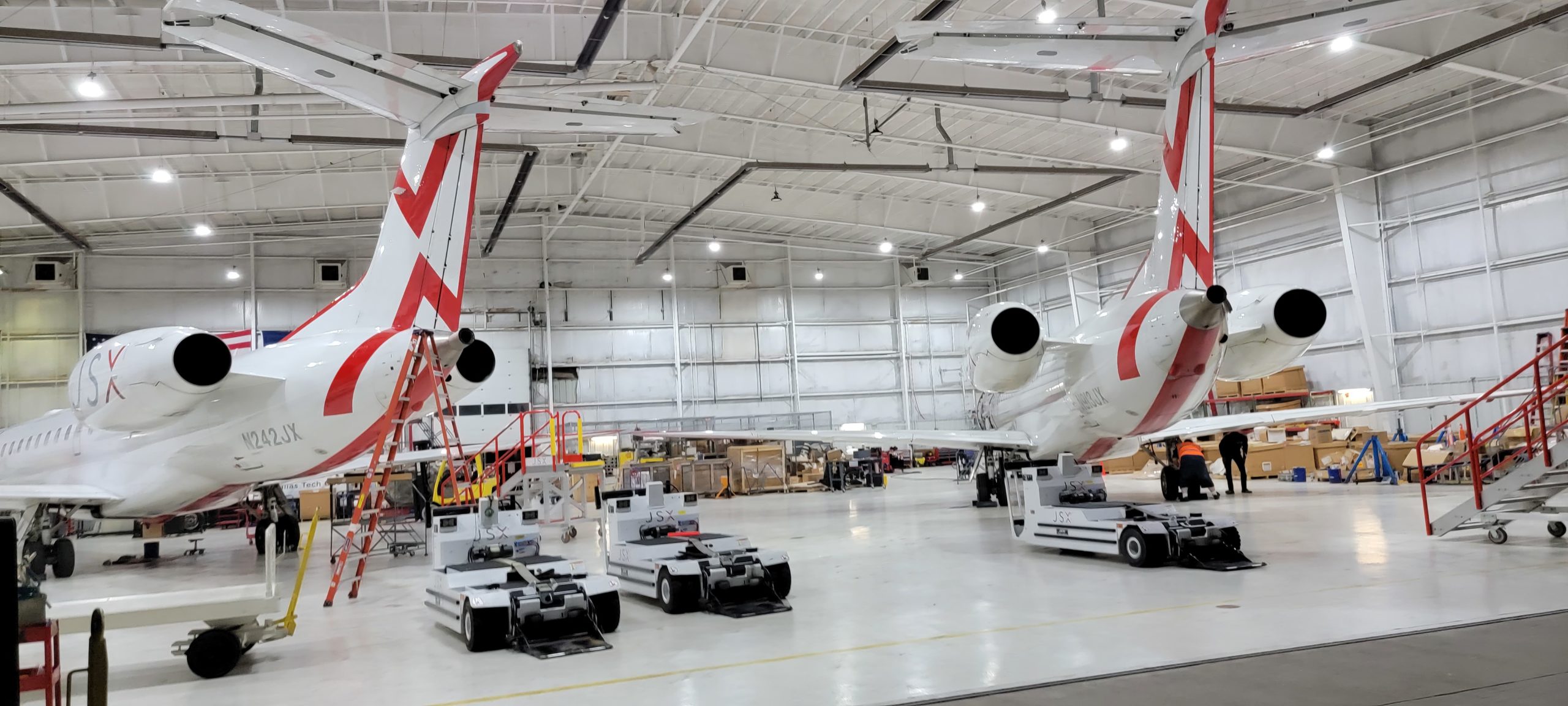
Other Interesting Provisions
I’m still reading through the document. I’ve reviewed more than just the summaries, and have begun combing through the legislative language. For instance, I haven’t yet read the sections on aviation fuel or drones. In the meantime there are several other interesting items that stand out so far.
Small hub airports and larger will have to put up passenger rights posters at “ticket counters, security checkpoints, and boarding gates” concisely outlining federal law with respect to “flight delays and cancellations…refunds…bumping of passengers from flights and the oversale of flights; and…lost, delayed, or damaged baggage” within one year.
In response to Frontier’s decision 18 months ago to eliminate telephone customer service every airline serving the U.S. will be required to have 24 hour phone customer service or text/chat service within 120 days.
DOT customer dashboards will become mandatory (so the next administration can’t drop them) and will have to include family seating and seat sizes.
The FAA is supposed to finally implement NextGen air traffic control by the end of 2025. Pressure here is that the FAA’s office gets sunset at that time. I don’t think it’ll actually matter. Telling the agency to finish the project doesn’t mean they’re capable of doing so in a way that actually improves airspace capacity, improves safety, and reduces delays.
Aviation rulemaking committees set up under this act get to deliberate in secret.
The FAA is going to have to look at airline uniforms, and whether they’re safe for pregnant workers. Workers frequently complain about reactions to the fabric of new uniforms, though in many cases it’s not something that’s been scientifically established to be an issue. Congress is concerned here only with pregnant women. The FAA also has to issue guidance to airlines on accommodating crewmembers who need to pump breast milk “during noncritical phases of flight.”
When hiring for air traffic control positions, the Act makes clear that the agency cannot throw away the applications of white people (‘technical correction to the existing prohibition on using biographical assessments when hiring certain air traffic control specialists’). Yes, they actually (effectively) did that. No, it didn’t compromise safety.
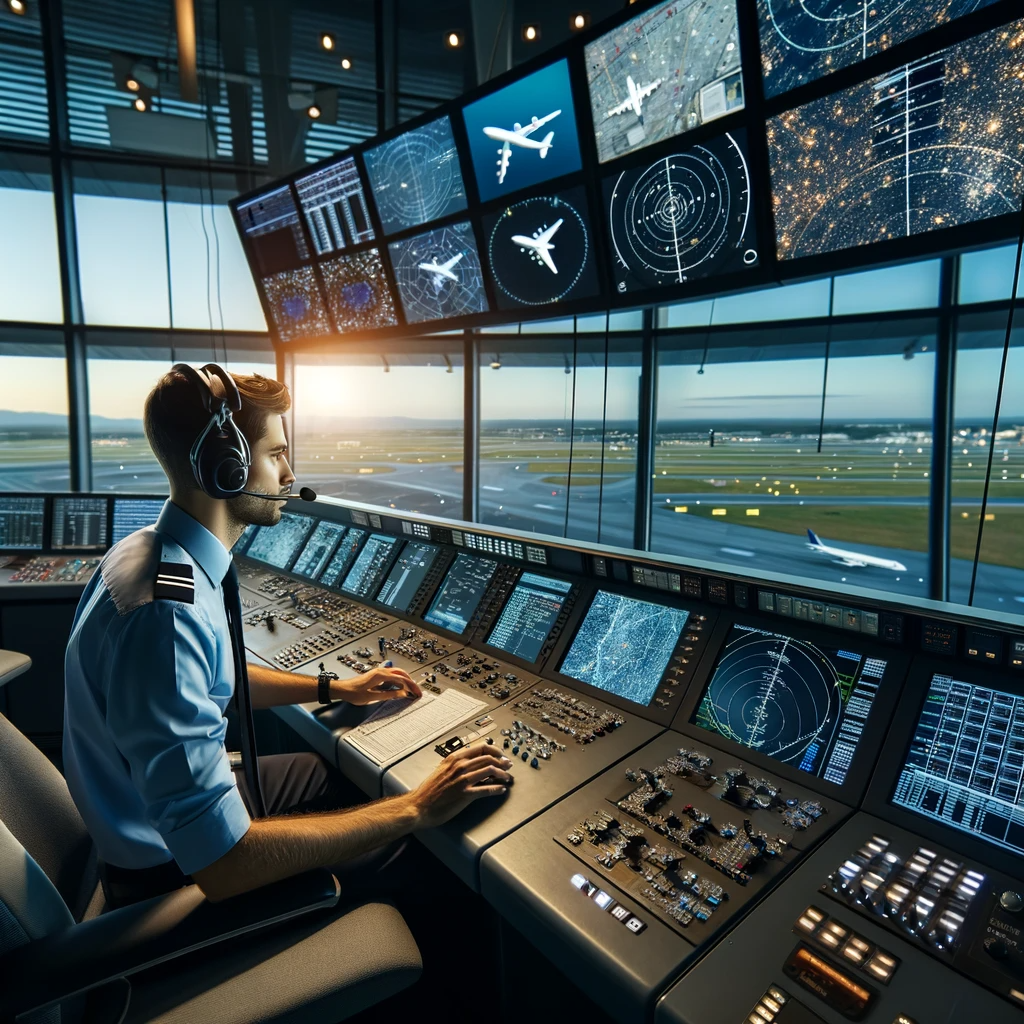
The same penalties that apply to interfering with security screening personnel will extend to airport and airline personnel “performing ticketing, check-in, baggage claim, or boarding functions.” Interestingly I don’t think that applies to when airlines contract out these functions to a third party like Menzies. Civil penalties for violations of aviation regulations increase from $25,000 to $75,000 maximum, though in practice passenger fines are almost never enforced or paid.
The Bureau of Transportation Statistics will have to consider FAA-caused air traffic control problems as a new cause of delay. Airlines will have to allow families with children under 14 to sit together, even though major airlines already accommodate this.
New DOT rules requiring refunds for significant schedule changes are codified in law. Where airlines offer vouchers as an option in lieu of refunds, those will have to be valid for at least 5 years (generally only Southwest, whose travel credits do not expire, currently complies).
Federal Airport Improvement Program grants cannot be used to buy jetbridges made in China. The FAA will have to accept digital drivers licenses and ID cards (but this doesn’t apply to TSA). And the FAA cannot mandate Covid-19 vaccination for its own employees or contractors or at airlines. Airlines are also prohibited from denying service to an unvaccinated passenger, though that really wasn’t ever a thing. We’re apparently not done with trade wars or vaccine wars.


Good riddance to Cancun Cruz’ ridiculous idea. He’s a massive hypocrite – he keeps whining about back doors and saying there should only be one door… yet here he tried to give himself a back door.
So far I am pleased. Bye-bye to special privileges, okay with a couple extra slots at DCA, and fine with the small airport subsidy.
It is wrong not to increase the pilot age max to 67. They said that there is no longer any pilot shortage. However, that is only because they reduced the qualifications for pilots to fly at commercial airlines-i.e. inexperienced pilots. The airlines are cheap and would sacrifice safety for less experienced pilots. Remember, we live in a country where the commander in chief is very elderly and, probably, suffering from some dementia or alzheimers. Also, multiple politicians are over 70 and still running this country. This was just wrong. Shame on the FAA and on the politicians.
Ted Cruz is a loser. He needs to be held responsible for not representing the majority of Texans.
The 24 hour phone customer service rule just makes sense.
Now let’s tax miles earned for work or on tickets expensed as a business expense.
It’s rather telling that the government actors care to increase the privacy of travelers flying via private jets but have done nothing to increase the privacy of people traveling by common carrier scheduled flight and other way more common means of transport than private jet.
overall, a pretty good bill. address pressing core issues (ATC) while incrementally eroding protectionism (DCA perimeter slots).
As with unions, DL asks for more than it expects to achieve.
Start the poll for what new routes will be added.
Yeah, UA is the loser – all of the big 4 have a hand.
and pilots get to enjoy their retirement.
Señor Leff,
While you too know about the jokes about being a “thought leader”, it’s time like this where I think more people should be impressed by how much thought and time you have invested in actually getting a lot of knowledge about matters in this space and in sharing your take on them when the opportunity arises. The Jerry Springer Show isn’t the only show in town on VFTW.
Hold on a second. Did I read that airlines will be REQUIRED to seat families with children together? I buy a ticket. I pick my seat. I intend to sit in that seat. A “family” then decides to buy a ticket AFTER I have a confirmation. There are no contiguous seats available. That’s THEIR fault for not buying seats early enough. SO…the airlines will TAKE my reserved and paid for seat so that Johnny, Susie’s and their late acting parents leave me with the middle seat that I intentionally bought my aisle or window seat? WRONG!
@Anna, there so many reforms needed in tax law. You picked small potatoes.
win,
take a deep breath.
Airlines don’t assign all seats specifically so they can accommodate unseated passengers.
There is nothing that says that family won’t end up together in the last row in front of the lavs which were never available for advance assignment.
I’m with you on that @Win Whitmire. The reasons that families don’t sit together is usually because of their own actions. I try to be minimally disruptive by choosing a window seat and rarely getting out. If I was reassigned to a middle seat (the type of seat most likely open), the people on either side of me are probably not like it as I am a big guy.
Part of those EAS routes is “follow the money”. Gary’s right when he says that Decatur, IL is an hour from Champaign/Urbana and Springfield. He neglected to mention that Bloomington/Normal is less than an hour away as well (I’ve driven that a number of times and will do so again in about a month), and that airport has service from American, Delta, Allegiant, and Frontier. So there are a lot of options.
So with three airports that can connect to any number of hubs an hour’s drive away, why does Decatur have Essential Air Service? It’s because of who the service is essential to. The reason that Decatur has EAS is that it’s the world headquarters of Archer Daniels Midland, one of the world’s largest agribusinesses. They’ve got two large campuses of agriproducts manufacturing in the city and the employees there are in the thousands, including C-Suite types. I know this; I’ve audited a number of those plants. By the way, the whole city stinks of the soy processing that goes on there. Just in case you ever had the desire to try out EAS service there.
My favorite part of the above section concerning the proposed 25-hour cockpit recorder:
“ In fact there is speculation . . .”
That’s a really clever—and incontrovertible—form of argument. Let’s all give it a whirl:
“In fact there is speculation that this blog is written by AI, and that 73.6% of the reader comments are generated by bots controlled by people whose last name end in “ov.”
On the other hand, thanks for the summary. I appreciate it.
@InLA – well, it’s not *mere* speculation, it’s strongly believed by many familiar with the situation
@anna really? at what value would you tax them at? if they have value then they can be gifted transferred to others, they can not expire, Their redemption rate can not change. If any of these did happen then the taxpayer can claim a loss on their tax return.
I would think that S&H Green stamps would be a case law to show that miles are NOT Taxable.
The FTC sued them for trading the Stamps, and lost at the supreme court level.
Excellent summary! Thanks Gary.
don’t forget that United had a flight from HNL to the mainland that came within feet of ending up in the Pacific because of pilot error but continued on, overwriting the event. The 25 hour cockpit would have made that event discoverable.
Pilots talk all the time about why they should make so much money but when the sh** hits the fan, this is the kind of thing that pilots SHOULD be capable of proving why they are better than computers. And the evidence should be there to show whether they are doing the best or not.
Still simping for the right whinge eh Gary? Cruz running away from his constituents is merely a “political blunder”.
@747always – I have covered Cruz’s play here – negatively – more than anyone else. I have covered Cruz negatively more than any other travel site. What on earth are you on about?
My thought is why do Texans keep reelecting Cancun Cruz? If you don’t want a Dem, surely there must be another Republican that could challenge Cruz in a primary.
I was on an OWB flight to ORD a week ago and surprisingly there were more than 15 pax on board the early morning flight.
We must pass it to find out what’s in the bill
The 25 hour recorder rule could be done a different way. There are both radios and encryption that would make the recorders redundant. Strongly encrypt all information and transmit it to a storage center. The encryption key goes to a company in another country that has strong laws and the means to resist pressures from powerful countries. When the parties involved agree, the key would be supplied to the proper technicians to decode the information. Most definitely make it so lawyers in the USA cannot sue to obtain the key. If such a system was in place for MH370, it probably would have been found.
Families should get seats together even on wowie-zowie super econo mega lo mart fares (that don’t let the purchaser pick a seat at the time of booking) only if:
Contiguous seats are available at the time of booking, or
Contiguous seats are available when they get assigned seats at check-in.
Otherwise, they should get what is left. Exception: A child six or younger needs to be seated with one of the parents.
A relative of mine always books these super-duper fares because they are $30-50 less than the economy fare that does allow seat selection. But then her children are 13 and 11.
you may not like Ted Cruz but let’s see how many others vote for this. It has to be voted on and passed by more than one member of Congress. My guess is (as noted in your article) — Members of Congress, Cabinet Secretaries, and federal judges who have received any threats (and they almost all receive threats at some point) would have received an escort for their entire journey through commercial airports and won’t be required to go through normal screening – instead receiving private screening.
…Just wondering why the same airport screening points for pilots, crew members, and other “cleared” individuals could not accommodate this request. It’s not like he’s wanting to take government owned planes for personal travel to bypass commercial flights like has been done in the past by some other members of congress.